Early years free entitlement 'crisis' in spotlight
Jo Parkes
Friday, April 22, 2016
Sector leaders have criticised the administration of the early years free entitlement during an inquiry considering the DfE’s £2.7 billion investment.

The programme is under scrutiny after a National Audit Office report publish in March, found the department was not getting value for money because it ‘cannot track the effectiveness’ of the investment.
The Public Accounts Select Committee will consider the evidence and is expected to publish its recommendations in early summer.
Witnesses, including Neil Leitch, chief executive of the Pre-school Learning Alliance, claimed that deprived children – the ones who should be gaining the most from the intervention – may be the least likely to benefit once settings take the full brunt of any underfunding, linked to next September's 30 hours extension.
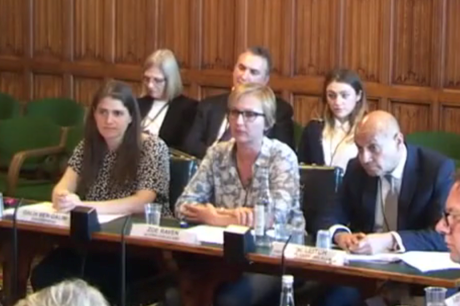
Automatic pension enrollment and the national living wage are compounding the issue, the cross-party committee of MPs also heard.
Families refused free entitlement
Chairman Meg Hillier said that she was aware of reports of settings bending the rules by refusing the free entitlement to families who cannot spend money on extra hours, and asked how widespread this is.
Dalia Ben-Galim, director of policy at lone parents’ charity Gingerbread, said, ‘It’s definitely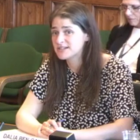 normal practice. I have case studies here that say, “My provider will only let me access the hours if I take another eight or nine hours. I can’t afford eight or nine hours because my ex-partner isn’t paying any child maintenance I can’t make that work.”’
normal practice. I have case studies here that say, “My provider will only let me access the hours if I take another eight or nine hours. I can’t afford eight or nine hours because my ex-partner isn’t paying any child maintenance I can’t make that work.”’
Ms Ben-Galim said Gingerbread has heard ‘case after case’ of desperate parents telephoning the organisation to report: “I don’t know what to do, it means I can’t access the free entitlement, it means I can’t go to work, it means I’m going to end up at Job Centre Plus”, and kind of the cycle begins. It’s the same theme emerging time and time again.’
Zoe Raven, chief executive of nursery chain Acorn Childcare, said it was inevitable that over-subscribed nurseries would select children based on economic reality.
‘If you’re a popular nursery, are you going to take a child with just the free entitlement, with a gap in the hours that you’ve got no income for, or are you going to accept a parent who is able to pay for the full session?’ said Ms Raven.
‘Private providers, they need to pay their staff and their overheads, so accepting funded places which don’t cover the whole session doesn’t make any sense for them, so they will prioritise parents who can pay for the full session.’
Deprived areas need more funds
The committee heard that settings in more deprived areas would struggle the most if funding is not adjusted to take account of their additional burden.
Mr Leitch said it was ‘difficult to deny’ such providers will ‘suffer harder’.
He added, ‘They have more more cases to deal with which have special needs, children in care, at risk register, etc.
‘Therefore there’s more of a workload. We have to attend more more meetings outside the conventional environment.
‘There’s no funding to pay for that and there’s no consideration in terms of average rates.’
Karin Smyth MP picked up on Mr Leitch’s point that there is ‘no mechanism’ for improving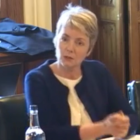 funding, and asked about the role of local authorities to ‘sort of steward the market’.
funding, and asked about the role of local authorities to ‘sort of steward the market’.
Local authorities need to be compelled by law
Mr Leitch said that a 2014 government move to get councils increasing free entitlement hourly rates, needed to be a legal requirement.
He said senior local authority executives speaking off-the-record, describe their ‘massive sympathy for the sector’ and their desire ‘to do more’.
But they say they are torn between a ‘variety of challenges’, meaning early years is ‘effectively no exception’, explained Mr Leitch.
He added, ‘In 2014 they were given directives to try to pass as much [funding] as they possibly could across to the early years sector. It’s had no impact whatsoever.
‘So I think I’m saying that unless there was a mechanism that stipulates that x, y, z must be passed across, whether it’s 95 per cent or 100 per cent, it’s very difficult to imagine that they’re going to say, “Ok, we’ll leave the potholes, and the lights; we’ll pass it to the early years sector”, because there’s no precedent or evidence to show that they will do it.’
Post code lottery
Ms Raven also described an effective post code lottery lottery in terms of rates and also 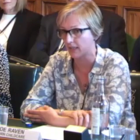 payment frequency, which ‘makes life very difficult [for providers] because it’s not a level playing field’.
payment frequency, which ‘makes life very difficult [for providers] because it’s not a level playing field’.
She said, ‘There’s a huge problem with different local authorities paying different rates. I know there’s a proposal that’s going to be standardised, but there’s different ways local authorities pay, different patterns.
‘A four year old in one county will get a lot more than a four-year-old in another county. That makes no sense whatsoever.
‘Our problem is the early years part of the local authority has all but disappeared.
‘That’s adding to the burden - all they’re really having to do now is look at those settings which are inadequate or need improvement.
‘They don’t have a remit to support the best of us.’
Where will the extra staff come from?
John Pugh MP asked if settings were proposing to cater for increased demand expected as a result of the increased entitlement, simply by increasing workload, or by hiring more staff.
result of the increased entitlement, simply by increasing workload, or by hiring more staff.
Ms Raven responded, ‘I don’t know where they’re going to come from,’ and described a recruitment crisis that is only going to worsen.
She highlighted how entry on to childcare courses has ‘plummeted’ and there have been course cancellations.
‘So we’re all fighting over a shrinking workforce,’ she added. ‘Recruitment is a massive problem already, and so it’s going to get worse.’
Higher wages and graduate leaders
Stephen Phillips MP asked if better pay would attract more workers, and Ms Raven said more support for professional development was needed to achieve this.
‘It [pay] needs to escalate a lot more,’ she said. ‘We want a highly qualified professional workforce.
‘When we had the graduate leader funding and homegrown graduates incentive, I saw some really good practitioners become really excellent practitioners, because they had funding to do early years foundation degrees. It’s a huge shame that was cut off.
‘Quality has risen because of the growth in qualifications of the workforce. I believe it’s a more professional workforce than it was 20 years ago.
‘But now the rug’s been pulled from under our feet – there’s no funding. ‘The declaration that all nurseries were going to have a graduate leader has gone.’
Ms Raven said Acorn would not experience a ‘major impact’ from the national living wage, because it had already been working to increase pay.
Across the sector, however, she said existing pressure to improve pay to attract quality staff, would increase with the living wage, which risks shrinking the pay gap between qualified and unqualified staff.
Mr Leitch said, ‘You have to pay everybody else otherwise you don’t maintain those  differentials.’
differentials.’
Half of new mums unaware of entitlement
Moving on to how well the free entitlement does on helping parents into work, Ms Smyth referred to a report by the Social Mobility and Child Poverty (SMCP) Commission, a non-governmental organisation monitoring the effect of policy in this area.
She said the SMCP had revealed half of new mums do not know what their entitlement is and asked how that fits in to the debate.
Mr Leitch agreed parents needed to be better informed, but suggested it was convenient that they are not.
He said, ‘Potentially they’re not better informed because we couldn’t accommodate if every parent frankly understood what their entitlement was, I’d suggest.
‘Despite the fact that we have high levels of four-year-olds taking up the offer, parents still don’t really know there’s 15 hours entitlement and it’s probably worked in our favour and I say we, dare I say government’s favour, that that’s the case.’
Ms Raven said closure of children’s centres, which had previously acted as a ‘sign-posting mechanism’, would have impacted awareness.
She added that settings restricting sessions, for example to five hours over three days, makes the entitlement harder for parents to access and could lead to missed employment and training opportunities.
Stepping stone
Ms Raven compared that to a successful two-year-olds pilot in Milton Keynes, where a children’s centre was able to offer three hours a day, five days a week.
‘And some of those parents then were able to use the three hours to access training, interviews and they’ve then moved into employment and increased their sessions and move into full day care,’ she said.
‘So the three hours a day is a very effective stepping stone into employment.’
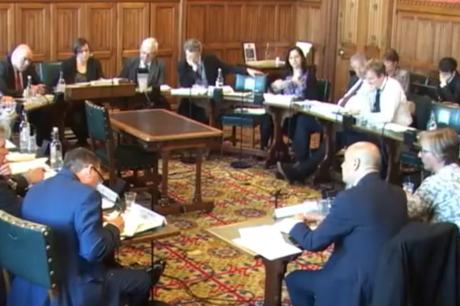
Ms Smyth asked if the ‘move to 30 hours decreases flexibility’ and Ms Raven warned it could mean places are halved.
She said, ‘We have three settings on school sites where the school offers 15 hours, morning and afternoon now if they then turn those two sets of 15 hours into one set of 30 hours, that’s going to halve the number of children they can take, so I don’t know what’s going to happen to the other half.’
Halved places will favour better off families
Ms Ben-Galim said there is a ‘massive risk’ that the 30-hours policy will exclude those most in need, if it means settings halving the number of places available.
‘I guess the risk I would highlight is which kids would miss out and which kids would have access to those 30 hours,’ she said.
She explained that eligibility is framed around parents who are in the equivalent of 16 hours’ work at national minimum wage.
‘I guess our concern is around single parents,’ she said. ‘If you want to increase the maternal employment rate, you want to be focusing on those with lower skills and single parents and I guess the risk of increasing to 30 hours, decreasing the number of places available, means are you targeting an employment policy at the type of people who need the right levels of support?
‘I think that’s a massive risk as the policy is rolled out.’
Mr Leitch said, ‘”Affordable flexible childcare” is a lovely term, but in reality, for the free entitlement it just doesn’t work.
‘The idea in the review that we should be tougher on ratios and work to the maximum is contrary to flexibility.’
Turning three in dribs and drabs
Ms Raven quipped that ‘the problem with two-year-olds’ is they become three in ‘dribs and drabs’. The models work great on paper, she said, but over the year, funding drops, ‘but then nothing else drops’. She added, ‘You still have the same number of staff. You can’t make a member of staff redundant until the September.’
Asked by Caroline Flint MP ‘how much tracking’ of the benefits of two-year-olds receiving  the 15 hours takes place, Mr Leitch said, ‘The reality is we don’t track whether it has an impact on families earning more or going back into employment.
the 15 hours takes place, Mr Leitch said, ‘The reality is we don’t track whether it has an impact on families earning more or going back into employment.
‘We assume if that was part of the purpose of the scheme the DfE would be doing that; there seems to be little evidence it’s effectively tracked.
‘I have to say, on the 30-hour move, there is no evidence that shows it’s in the best interests of child to move from 15 hours to 30. And in all the rhetoric that’s given there’s very little reference to what’s in best interests of the child.’





